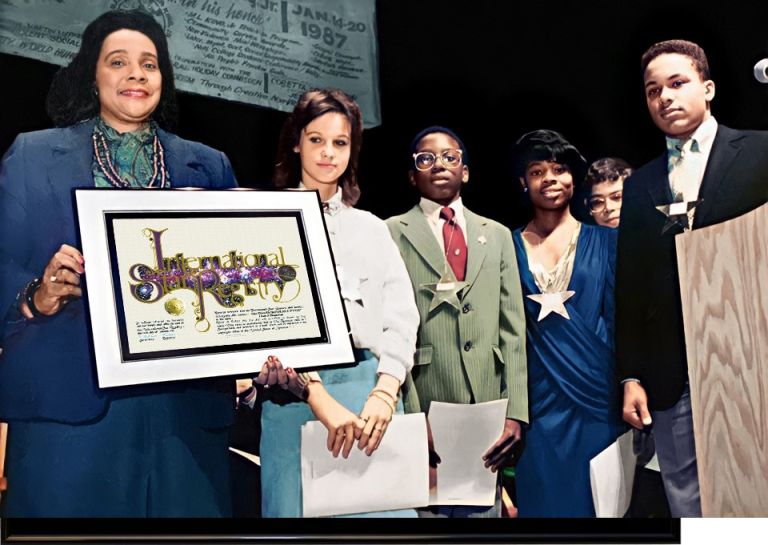
On January 15, 2024, we celebrate what would have been the 95th birthday of Martin Luther King Jr., a transformative figure in the fight for civil rights and equality. Known worldwide for his commitment to justice, Dr. King’s contributions to society continue to inspire. In honor of his legacy, a star in the Ursa Minor constellation has been named after him, a celestial tribute to his enduring light. This post reflects on his remarkable journey, the significance of the Ursa Minor constellation, and why dedicating a star can be a meaningful personalized sympathy gift or a 95th birthday gift idea.
Early Life and Education
Martin Luther King Jr. was born on January 15, 1929, in Atlanta, Georgia, into a family deeply rooted in the Baptist faith. His father, Martin Luther King Sr., was a pastor, and his mother, Alberta Williams King, was a schoolteacher. This nurturing environment laid the foundation for King’s dedication to education and advocacy.
King attended Morehouse College at the age of 15, where he earned a degree in sociology. His academic journey continued with a Bachelor of Divinity from Crozer Theological Seminary and a Ph.D. in systematic theology from Boston University in 1955. It was during this time that King developed his philosophy of nonviolent resistance, inspired by figures like Mahatma Gandhi and Henry David Thoreau.
Leading the Civil Rights Movement
Dr. King rose to prominence in 1955 as the leader of the Montgomery Bus Boycott, a pivotal event in the American Civil Rights Movement. The boycott, sparked by Rosa Parks’ arrest for refusing to give up her seat on a segregated bus, lasted over a year and resulted in the desegregation of public transportation.
As president of the Southern Christian Leadership Conference (SCLC), King became a central figure in organizing nonviolent protests across the United States. His leadership in events such as the Birmingham Campaign, the Selma to Montgomery marches, and the March on Washington solidified his status as a symbol of hope and resistance.
The “I Have a Dream” Speech
One of Dr. King’s most memorable moments came on August 28, 1963, during the March on Washington for Jobs and Freedom. Standing before a crowd of over 250,000 people at the Lincoln Memorial, he delivered his iconic “I Have a Dream” speech.
In this speech, King envisioned a world where individuals would be judged not by the color of their skin but by the content of their character. His words resonated deeply, galvanizing support for the Civil Rights Act of 1964 and the Voting Rights Act of 1965, both of which became cornerstones of his legacy.
Tragic Loss and Everlasting Legacy
Dr. King’s life was tragically cut short on April 4, 1968, when he was assassinated in Memphis, Tennessee. His death was a devastating blow to the fight for equality, but his legacy has endured. In 1983, Martin Luther King Jr. Day was established as a federal holiday, ensuring his contributions are remembered annually.
A Star in Ursa Minor: Honoring Dr. King’s Legacy
As a tribute to his profound impact, a star in the Ursa Minor constellation has been named after Martin Luther King Jr. through International Star Registry. This gesture symbolizes his enduring light, guiding humanity toward justice and peace.
Ursa Minor, also known as the Little Bear, is home to Polaris, the North Star, a beacon for travelers throughout history. The constellation’s significance aligns perfectly with Dr. King’s role as a guiding force in the journey toward equality. Naming a star after him is a fitting way to honor his legacy, ensuring his light continues to shine.
International Star Registry: A Unique Tribute
International Star Registry allows individuals to commemorate loved ones with the timeless gift of naming a star. Whether as a “personalized sympathy gift” or a “95th birthday gift idea,” dedicating a star is a heartfelt way to honor someone special.
The process is simple yet deeply meaningful. Recipients receive a certificate of authenticity, star charts pinpointing the star’s location, and the knowledge that their tribute will be recorded for posterity. For Dr. King, the star in Ursa Minor serves as a celestial reminder of his profound contributions to humanity.
Continuing the Dream
Dr. King’s dream of equality, justice, and compassion continues to inspire new generations. From his speeches to his nonviolent protests, his vision remains a cornerstone for activism worldwide.
On what would have been his 95th birthday, we are reminded of the importance of carrying his legacy forward. Whether through community service, advocating for justice, or finding ways to honor his memory—such as naming a star in his honor—we can each contribute to his dream of a better world.
Why Naming a Star is the Perfect Tribute
A star dedication is more than a gift—it’s a testament to someone’s lasting influence. For a figure like Martin Luther King Jr., whose light continues to shine brightly in the hearts of millions, this celestial honor is a fitting symbol of his enduring legacy.
Whether as a “personalized sympathy gift” to honor a loved one or a “95th birthday gift idea” for someone who inspires, naming a star offers a meaningful and timeless way to celebrate life and legacy.
Conclusion: Celebrating Dr. King’s Light
As we commemorate the 95th birthday of Martin Luther King Jr., we honor not only his life but also his indomitable spirit. The star named after him in the Ursa Minor constellation shines as a reminder of his unwavering dedication to justice, equality, and hope.
Through the International Star Registry, we have the opportunity to create lasting tributes to those who inspire us. For Dr. King, the star in Ursa Minor is a celestial symbol of a legacy that continues to guide humanity toward a brighter future.
Let us take this moment to reflect on his contributions and ensure his dream lives on in our actions and hearts.
